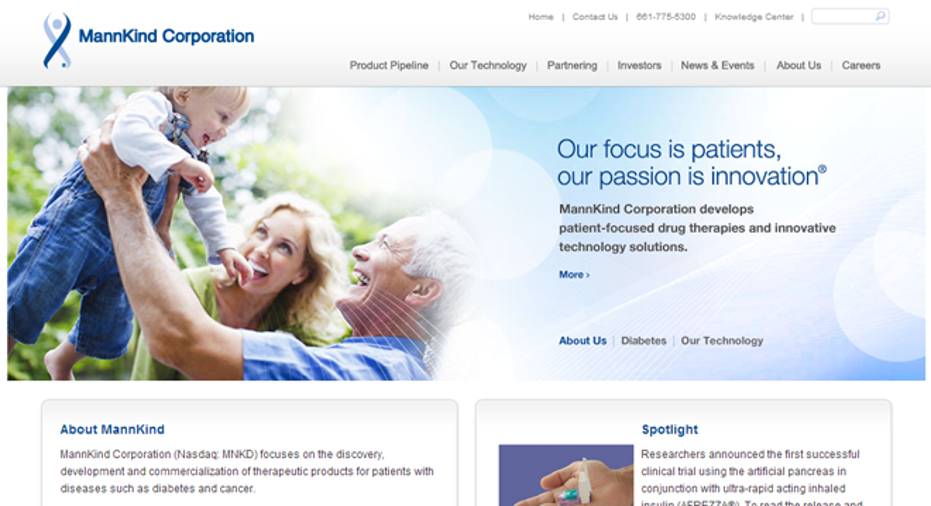Sanofi bets on inhaled insulin with up to $925 mln MannKind deal

French drugmaker Sanofi is betting on inhaled insulin as an alternative option to daily injections for diabetics by signing a worldwide licensing agreement with MannKind Corp worth up to $925 million.
Inhalation promises people with diabetes much greater convenience than routine injections but it remains unclear how widely it will be adopted, given concerns about the potential risks associated with breathing powdered insulin into the lungs.
The deal is the latest example of Sanofi exploring novel ways of treating diabetes, which it sees as a core growth area for its business as the number of people suffering from the disease rises around the world.
Sanofi currently enjoys the No.2 spot in a global diabetes market worth over $40 billion a year but it faces challenges as its top-selling drug Lantus, the world's most prescribed insulin, is set to lose patent protection next year.
Under the new arrangement, Sanofi will have the right to develop and market MannKind's recently approved inhaled insulin therapy Afrezza for adults with both type 1 and type 2 diabetes, the two companies said on Monday.
The partners plan to launch Afrezza in the United States in the first quarter of 2015.
U.S.-based MannKind will receive an upfront payment of $150 million and potential further milestone payments of up to $775 million, depending on the drug's commercial success. Sanofi and MannKind will share profits and losses on a global basis, with Sanofi retaining 65 percent and MannKind the rest.
Sanofi has agreed to advance to MannKind its share of the collaboration's expenses up to a limit of $175 million, the companies added.
WHISTLE-SIZED INHALER
Afrezza is delivered via a whistle-sized inhaler, and it acts more rapidly than injectable insulins made by Sanofi or rivals such as Eli Lilly and Novo Nordisk.
However, its path to market has not been easy. Afrezza was developed in the shadow of Pfizer's failed inhaled insulin Exubera, which was approved in 2006 and expected to generate annual sales of $2 billion. That inhaler was big and bulky and patients were put off by the need for periodic lung function tests. Eventually it was withdrawn.
Exubera's failure, together with concerns the inhaled powder could increase the risk of lung diseases, has led to some investor skepticism about Afrezza's future. Industry analysts currently expect Afrezza to generate sales of about $1 billion by 2019, according to consensus forecasts compiled by Thomson Reuters Pharma.
MannKind's product was finally approved by the U.S. Food and Administration in June, but it will carry a boxed warning of the risk of acute bronchospasm, or constriction of the airways of the lung, in patients with asthma and chronic obstructive pulmonary disease.
As a result, the regulator has required a risk evaluation and mitigation strategy for the product to ensure that its benefits outweigh the potential risks.
According to the prescribing information, patients with chronic lung disease should not use Afrezza and doctors are also advised to make extensive checks to identify potential lung disease before prescribing the product.
The label also recommends it not be used in patients who smoke or who have recently stopped smoking.
BROADER PORTFOLIO
For Sanofi, the drug and device combination offered by Afrezza is another way to broaden its diabetes portfolio at a time when many large pharmaceutical companies are eyeing the area with interest.
"Afrezza is a further addition to our growing portfolio of integrated diabetes solutions," said Pierre Chancel, Sanofi's diabetes division head.
"It is uniquely positioned to provide patients with another insulin therapy option to manage their diabetes but does not require multiple daily injections."
Two months ago Sanofi struck another drug-device diabetes alliance with U.S. medical technology company Medtronic. That deal will bring together Sanofi's insulin portfolio and Medtronic's insulin pumps and glucose monitoring, with a focus on sufferers unable to achieve glucose control despite multiple daily injections of insulin.
An estimated 382 million people worldwide have diabetes and the number of cases is expected to rise to 592 million by 2035, according to the International Diabetes Federation. Type 2 diabetes, which is associated with obesity, accounts for the vast majority of cases.
Greenhill acted as financial adviser to MannKind on the Sanofi deal. (Editing by Erica Billingham)



















